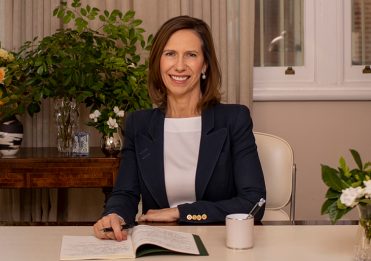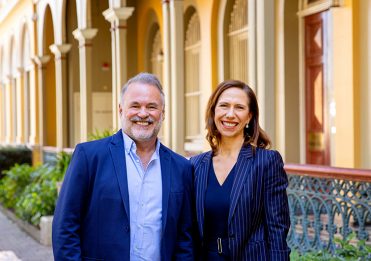There is always significant emotion attached to the return to work and school—excitement and expectation but also (in anticipation of the unknown) nervousness, uncertainty, some appropriate, humble self-doubt. Nowhere is that sharp juxtaposition of excitement and nervousness more evident than among our Year 7 girls, as they begin at Girls Grammar, and the young women of Year 12 who have been presented with, and are now proudly wearing, their XII badges. In our first week, somewhat shrouded by the novel coronavirus, staff and students eagerly reunited, began their classes and new subjects, explored the School and set goals for the year.
We recognised Australia Day at our first Assembly and Dr Alix Vann, School Psychologist, presented the Australia Day Address. Before returning to BGGS—she is a past student, who was Proxime Accessit to the Dux of the School in 2003—Dr Vann worked in clinical and private practice settings where she developed a deep interest in working with adolescent girls. Her reflections on our past, and the importance of compassion within our School community and in our national character, have a particular resonance in these somewhat complex times.
It’s been just a little more than 100 years since World War I, when Australia was tested, and in many ways forged its early national identity, at Gallipoli and other battles. For the first time the nation, newly come into being, was truly tested. None of us have lived through that or, thankfully, have any true insight into that horrible time in our history, but we have all lived through and experienced, in some way, the devastation of recent bushfires.
Many of you will have had friends or family personally affected; others will have driven through the charred remains left in the wake of a recent blaze on the road to your beach holiday—places you may never have expected to be affected—or travelling to visit family inland. All will have seen images on the television and our devices—compelling, incomprehensible—that are impossible to forget. Bewildering images of ships rescuing people from coastal townships. Black skies at 9 am. Blazing fires and billowing plumes of smoke. Images of helpless koalas, the animal that, along with the kangaroo, represents us around the world. This fauna, so uniquely ours, suffering with horrific burns. Images that propelled Australia onto the global stage—eliciting shock and sympathy in equal measure from all corners of the globe.
It’s always interesting of course to see ourselves reflected in others and projected back to us as we consider, in 2020, who and what we are as a nation. For as an island nation, often far removed from the centre of global trends and debates, we took centre stage. And the focus was on our land, our natural environment, the climate. As a School that aims to educate girls and young women to take their place in society, to be good citizens with a strong sense of identity and purpose, these are important questions and issues to explore.
The bush legend, which in our highly urbanised society may not seem to have ‘fit’ us in recent times, has been seen as a mythological representation of Australia. And yet the land—this great brown land that intimidated the arriving Europeans and was carefully managed by our Indigenous people—continues to assert its presence, in our lives, in our experiences, in our psyche and in our Australian identity. As the smoke and haze settled over some of the most iconic representations of Australia—most apocalyptically, the Sydney Opera House—we were reminded that the land is not just ‘out there’ but that we are all intimately connected to it. Indigenous people have always understood this. The conventional disconnect between city and country was broken as smoke haze covered Brisbane, Sydney, Melbourne and the nation’s capital, Canberra. We could see it and feel it, smell it and even taste it—engulfed, it was all around us.
This harsh environment continues to test Australians but we have had testing times before in our history—bushfires, floods, war. The remarkable resilience and generosity we have seen can guide a commitment to find solutions, and how we respond as a nation and move forward will continue to evolve. What is certain is the importance of Grammar girls being well educated, deep thinking and open-minded. It is more important than ever that they develop an understanding of the powerful forces, natural and political, that shape our experience, and are empowered to contribute confidently and intelligently, not just to debate and discussion, but to finding solutions and a shared ‘way through’ as they look squarely and optimistically to the future.
It is wonderful to have the new academic year underway and we look forward to seeing it unfold.
Ms Jacinda Euler
Principal



